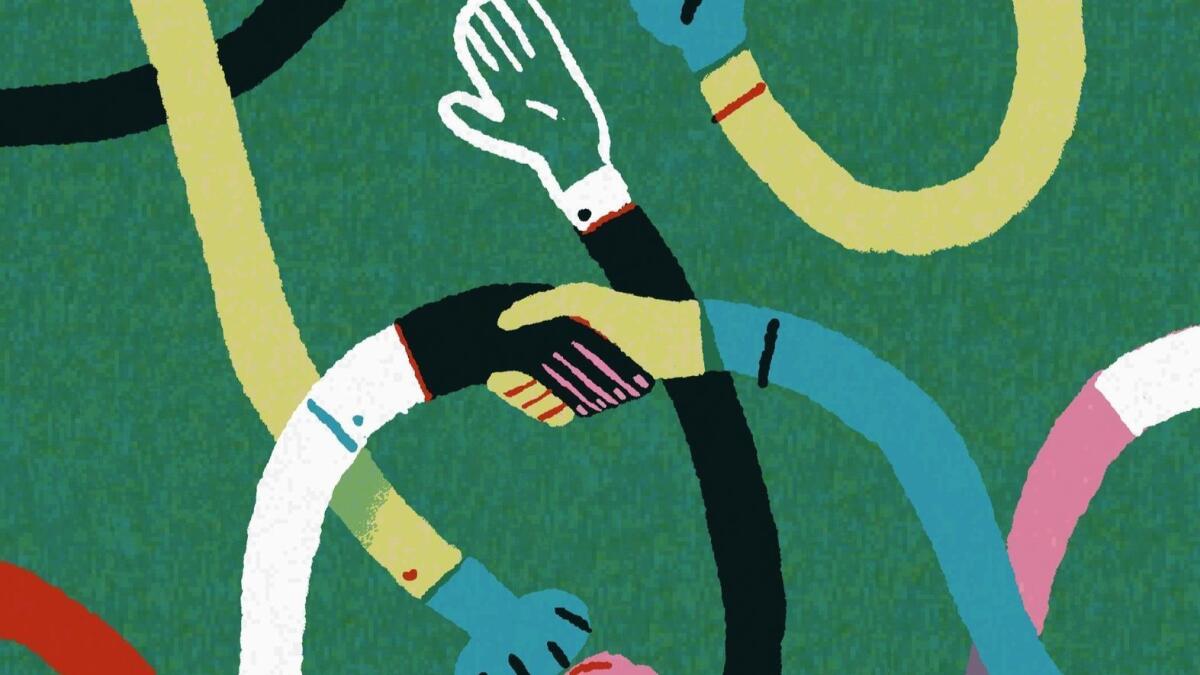Op-Ed: We used to be political rivals. We disagreed on the campaign trail, but we never called each other ‘fake’

- Share via
On the plane to Iowa during his long-shot 2000 presidential run, Sen. John McCain was girding to bluntly oppose that state’s highly popular ethanol subsidy as a travesty of corporate welfare. One of us (hint: the Republican one) told McCain: “Well, your job is to lose Iowa.” He laughed and ruefully replied: “Yeah, yeah, pal. Got it covered.” With McCain, what counted wasn’t the political calculation, but the fact-based argument.
McCain fought passionately, often unyieldingly, for the things he believed in. He also listened to others and sought ways forward on fraught issues like immigration reform, where he joined with his friend across the aisle Sen. Ted Kennedy to forge practical compromise.
The senator’s legacy is a sharp rebuke to the prevailing politics of the moment, which has reached stunningly divisive levels. Carefully considered arguments are often devalued in our public debate, leaving incendiary and degraded language to rule the dialogue and the day. Factual arguments have become the enemy, instead of the tools of debate.
We need to decontaminate a toxic atmosphere that casts those on opposite sides of the political spectrum as enemies.
This has produced a political environment where partisans can select their own, frequently fact-free version of events. Or, as we were recently told, “truth is not truth.” But it is: Facts are the indispensable currency of democracy. Words have power and they should reflect reality; when they inflame rather than inform, we are all the losers, regardless of party affiliation.
McCain was an exemplar, but not entirely an exception. Political leaders like Ronald Reagan and John F. Kennedy elevated our rhetoric instead of cheapening it. They spoke to the best parts of our souls; they summoned us to look upward rather than cast each other down. They knew that charting a course to a better country required an aspirational message that appealed to our defining ideals and enriched and deepened the idea of America itself. As Reagan put it: “I’ve always believed that a lot of the trouble in the world would disappear if we were talking to each other instead of about each other.”
This era of angry polarization demands that we live up to a higher standard. We must remind ourselves of how vital that standard is to our democracy. We need to decontaminate a toxic atmosphere that casts those on opposite sides of the political spectrum as enemies, rather than opponents who also share a fundamental respect for the values that underpin the American political process.
For more than 20 years, we have been fierce professional rivals operating in similar roles for dissimilar candidates. We have both spent late nights creating ads that explained precisely why the other’s client was the wrong person for the job. It was tough stuff, as politics tends to be. But not once did we call our opponents evil, or suggest that a fact that was harmful to our campaigns was flat out “fake.” After one particularly hot contest – we don’t have to say whose candidate prevailed – we went out together for Mexican food. Chatting over burritos and tacos became a — dietetically dubious — habit that continues to this day.
One night, Shrum asked Murphy: “How the hell did you end up as a Republican? I think it’s just an act of rebellion.” Murphy, whose family were all Kennedy Democrats, laughed and responded: “It was a little bit of rebellion and a lot of common sense.”
Enter the Fray: First takes on the news of the minute from L.A. Times Opinion »
So over the years we’ve become friends. Now we’re becoming professional partners. We are joining together to lead the new Center for the Political Future at USC’s Dornsife College of Letters, Arts and Sciences. Our purpose is to bring the academy into the public square. Our mission is to model and foster a politics where opposing sides operate on the common ground of good faith and fact-based arguments. And the center will sponsor a new project to examine how disruptive technologies are impacting our politics and how they can be used to strengthen rather than poison public discourse.
Although we have battled on the campaign trail and on television shows like “Meet the Press,” we never saw facts as fungible or felt personal animus. That shouldn’t be an oddity. It should be the norm: The survival of a democratic society doesn’t require friendship from adversaries, but it fundamentally depends on respect for each other – and for the truth.
Robert Shrum, a longtime Democratic strategist, is the director and Mike Murphy, a longtime Republican strategist, will be the co-director of the Center for the Political Future at USC Dornsife.
Follow the Opinion section on Twitter @latimesopinion or Facebook
More to Read
A cure for the common opinion
Get thought-provoking perspectives with our weekly newsletter.
You may occasionally receive promotional content from the Los Angeles Times.










